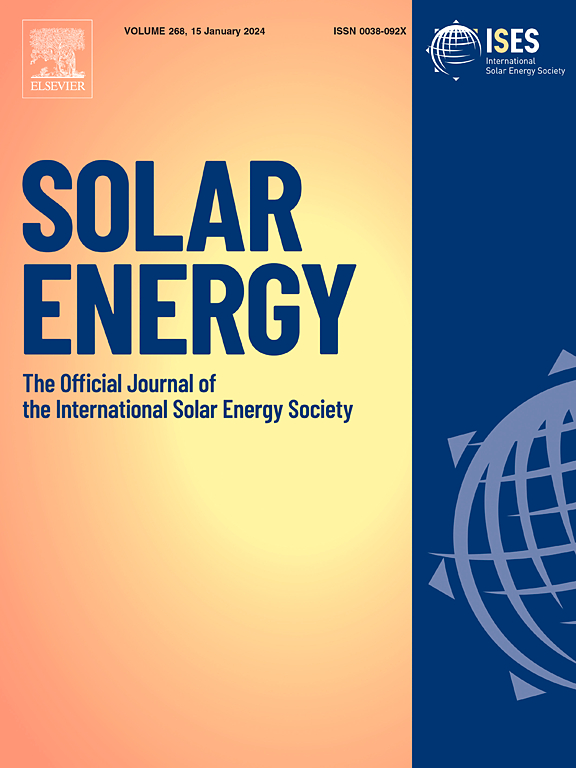Ultra-wideband solar absorber based on refractory metal titanium for high-performance photothermal conversion
IF 6
2区 工程技术
Q2 ENERGY & FUELS
引用次数: 0
Abstract
In recent years, metamaterial absorbers are widely used in solar energy harvesting and utilizations. Nevertheless, it is difficult to achieve simultaneously high absorption, insensitivity with a large angle of incidence, polarization independence and, highly efficient photothermal conversion over a wide range of wavelengths for existing solar energy absorbers. Herein, an ultra-wideband and high-performance solar perfect absorber for the spectral range of 200–5000 nm has been proposed. It consists of a Ti metal substrate, a Ti-Al2O3 pattern layer with etched square annular air cavity, and a Si3N4 dielectric layer surrounding the bottom of the pattern layer. Over the spectral range spanning from 200 to 5000 nm, the average absorbance is 97.7 %, and the minimum absorbance is above 91 %. In solar energy system, its total photothermal conversion efficiency is 90.9 % at 1000 K, with as much as 96.41 % of sunlight absorbed. The interactions between surface plasmon resonance (SPR), guided mode resonance (GMR), magnetic resonance (MR), and cavity resonance (CR) are responsible for excellent performance of the ultra-broadband absorber. Additionally, the absorber is not sensitive to wide angles of incidence and is polarization independent. More interestingly, large angle incidence at TE and TM polarizations has equally excellent performance. Besides, the absorber meets a certain tolerance for geometric manufacturing errors, allowing for low-cost practical manufacturing. The designed absorber is expected to be applied to solar cells and thermo-photovoltaic devices.
基于难熔金属钛的高性能光热转换超宽带太阳能吸收器
近年来,超材料吸收体被广泛应用于太阳能收集和利用领域。然而,现有的太阳能吸收器很难同时实现高吸收、大入射角不敏感、偏振无关以及宽波长范围内的高效光热转换。在此,我们提出了一种光谱范围为 200-5000 纳米的超宽带、高性能太阳能完美吸收器。它由钛金属基底、带蚀刻方形环形气腔的 Ti-Al2O3 图案层和环绕图案层底部的 Si3N4 介电层组成。在 200 纳米到 5000 纳米的光谱范围内,平均吸收率为 97.7%,最小吸收率超过 91%。在太阳能系统中,1000 K 时的总光热转换效率为 90.9%,对太阳光的吸收率高达 96.41%。表面等离子体共振(SPR)、导模共振(GMR)、磁共振(MR)和空腔共振(CR)之间的相互作用造就了这种超宽带吸收器的卓越性能。此外,该吸收器对大入射角不敏感,而且不受极化影响。更有趣的是,TE 和 TM 极化的大角度入射也具有同样出色的性能。此外,该吸收器还能满足一定的几何制造误差容限,从而实现低成本的实际制造。所设计的吸收器有望应用于太阳能电池和热光电设备。
本文章由计算机程序翻译,如有差异,请以英文原文为准。
求助全文
约1分钟内获得全文
求助全文
来源期刊

Solar Energy
工程技术-能源与燃料
CiteScore
13.90
自引率
9.00%
发文量
0
审稿时长
47 days
期刊介绍:
Solar Energy welcomes manuscripts presenting information not previously published in journals on any aspect of solar energy research, development, application, measurement or policy. The term "solar energy" in this context includes the indirect uses such as wind energy and biomass
 求助内容:
求助内容: 应助结果提醒方式:
应助结果提醒方式:


